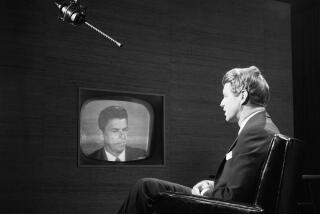But ‘Star Wars’ Remains a Contentious Issue : Two Leaders Try to Charm Each Other
- Share via
WASHINGTON — Although President Reagan and Soviet leader Mikhail S. Gorbachev engaged in some sharp and spirited exchanges at the summit in Geneva, U.S. officials who attended many of their sessions said the two world leaders also tried to charm each other and took pains from the outset to warm up the superpowers’ relationship.
Reagan took the first step, according to two U.S. officials, by referring to the humble backgrounds shared by the two men and “the great responsibility we now share as the whole world watches.”
Gorbachev responded warmly, “really putting on the charm, oodles and oodles of it,” one of the officials said.
Reagan told his aides that Gorbachev was “a very good talker and raconteur.” During a dinner toast, Gorbachev described a cartoon he had seen that showed Reagan and Gorbachev standing on mountaintops separated by a valley with a caption reading: “We need a better relationship.”
Gorbachev said the cartoon had Reagan declaring: “You take the first step.” The room erupted into laughter, according to an official, and Reagan joined in heartily.
Apparently to make sure the talks got off to a good start, Gorbachev did not raise Reagan’s “Star Wars” program of space-based defense--the most contentious issue dividing the United States and the Soviet Union--in his first lengthy meeting alone with Reagan. At that session, it was brought up “once, only once, and that was by Reagan,” an official said.
“Here is a guy (Gorbachev) who wanted to save any disagreements for later,” this official said. “He wanted to spend the morning getting a liftoff.”
Subsequently, however, Gorbachev threatened to build up Soviet offensive nuclear weapons if Reagan pursues “Star Wars,” known formally as the Strategic Defense Initiative, according to a U.S. official who participated in the talks. And Gorbachev also was quoted as telling Reagan: “We will build our own ‘Star Wars’ system, and it will be cheaper and more effective than yours.”
More generally, Gorbachev rejected the idea often voiced by Reagan that the Soviets are worried that they will be “driven into bankruptcy” if they try to keep up with the United States in the arms race, one of the officials said. “We will do what’s necessary to protect our security,” this official quoted Gorbachev as saying.
The U.S. officials estimated that half of the summit talks were devoted to regional issues, bilateral issues and human rights and the other half to arms control, with 80% of those discussions involving “Star Wars.”
Doubt Over Concept
Although Gorbachev threatened to aggressively pursue his own space-based missile system, he argued that he did not believe that the concept could work. Reagan conceded that Gorbachev might be right but added: “The research is going pretty well, and wouldn’t it be wonderful if it did work?”
Gorbachev argued, as he has in the past, that the space system would enable the United States to launch a first strike without fear of Soviet retaliation. Reagan countered that the United States would never attack the Soviet Union and that “Star Wars” should not preclude negotiations aimed at reducing offensive nuclear weapons.
Reagan also raised his “open laboratories” proposal for sharing research on technology such as that for “Star Wars.” A U.S. official said that Gorbachev, after hearing Reagan’s explanation, had a “simplistic” reaction: “Let’s have the laboratories open so we can make sure we don’t have ‘Star Wars’ being produced.”
Reagan repeatedly raised Soviet violations of the existing Anti-Ballistic Missile Treaty and the unratified SALT II agreement, citing specific examples, such as a controversial Soviet radar installation in Siberia. He said they cast “a very deep shadow” over arms control.
No Encouraging Reply
Gorbachev listened attentively to these complaints, an official said, but “he gave no response that would encourage us to think they would stop cheating.”
In fact, officials on the U.S. team acknowledged that there was no movement on any major issues during the summit. They conceded that the talks were not really negotiations but could more accurately be described as “an exchange of views.”
The summit’s most important contribution, they said, was to give the leaders a chance to size each other up, leaving less likelihood in the future that one would miscalculate the intentions of the other.
Reagan was reported to believe that the summit provided a valuable opportunity to demonstrate his resolve on a range of issues. He had been thoroughly briefed on past summits and wanted to avoid any underestimation of his “toughness,” the way Soviet leader Nikita S. Khrushchev misread John F. Kennedy in 1961.
Reagan had been told that Khrushchev thought Kennedy was “wimpish” and that Kennedy knew that was what he thought.
Conflicts ‘Increase Distrust’
Reagan warned Gorbachev, according to one official, that regional conflicts such as those in Afghanistan and Nicaragua were “destabilizing, don’t lessen suspicions but increase distrust and hurt relations.”
Noting that Gorbachev had said that relations were at their lowest ebb, Reagan said they needed to be improved. But “you can’t do it on nice smiles and good vibes between us,” Reagan was quoted as saying. “You have to do it on deeds.”
Some Administration officials found it encouraging that Gorbachev talked about reaching a “political settlement” in Afghanistan. But one of the senior officials traveling with the press on Thursday’s flight back to Washington said: “I think it’s grasping at straws, though it’s intriguing.”
Despite the good chemistry between Reagan and Gorbachev, officials emphasized repeatedly that neither leader had changed his mind on the major issues. “The Soviets had to walk away thinking Reagan had an iron fist in a velvet glove,” one of the participants said, adding: “And, you could say, we think the same about Gorbachev.”
More to Read
Sign up for Essential California
The most important California stories and recommendations in your inbox every morning.
You may occasionally receive promotional content from the Los Angeles Times.











